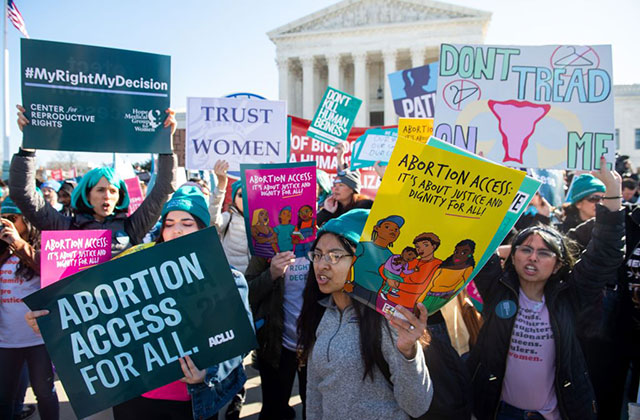Supreme Court Protects Abortion Rights in Louisiana

Abortion rights advocates can celebrate a major victory today following the Supreme Court of the United States’ (SCOTUS) decision to strike down an abortion law with a 5-to-4 vote that Chief Justice John G. Roberts Jr. helped sway, The New York Times reported Monday (June 29). Had it been upheld, the law could have left Louisiana with just one abortion clinic for the entire state. This was the Court's first abortion ruling since President Donald Trump appointed two conservative justices, according to the Times.
According to the SCOTUS decision, Roberts joined the liberal majority vote out of respect for precedent of a 2016 Texas ruling which would have required any doctor who performed abortions to have had “active admitting privileges at a hospital” no more than 30 miles away from the abortion site for health reasons. Louisiana has had its law on the books since 2014.
In an amicus brief that was filed by more than 50 social scientists last year— including those from Advancing New Standards in Reproductive Health (ANSIRH) and the Texas Policy Evaluation Project (TxPEP)—53 percent of pregnant people in Louisiana would have been forced to travel more than 150 miles to get an abortion if the current law wasn’t upheld.
Roberts wrote in the majority opinion:
The legal doctrine of stare decisis requires us, absent special circumstances, to treat like cases alike. The Louisiana law imposes a burden on access to abortion just as severe as that imposed by the Texas law, for the same reasons. Therefore Louisiana’s law cannot stand under our precedents.
Doctors and organizations that have been fighting to overturn Louisiana's law have pointed to studies showing that abortion procedures are safe and rarely have complications. In addition, 90 percent of those getting the medical procedure have it during the early stages of a pregnancy, usually at 12 weeks of gestation, enhancing safety and efficacy, according to the National Academies of Sciences, Engineering, and Medicine. Ultimately, members of the National Academies of Sciences, Engineering, and Medicine argued in 2018 that there was “no evidence indicating that clinicians who perform abortions require hospital privileges to ensure a safe outcome for the patient.”
Advocates are rejoicing, but Louisiana is not alone in its abortion restrictions. In fact, the Guttmacher Institute, which tracks reproductive health policies, reported that in 2019, 17 states, primarily across the South and Midwest, enacted 25 new abortion bans.
In response to the impact the SCOTUS’ ruling will have on Black women, those in rural communities and in the Southeast, Oriaku Njoku, co-founder and executive director of Access Reproductive Care-Southeast, told Colorlines:
Reproductive health, rights, and justice advocates, activists, and frontline clinic staff across the country came together to deliver this hard-fought win today. But our work does not and cannot end here. I know firsthand from my work in Georgia and across the Southeast the toll of restrictive state laws that push abortion care out of reach for the most marginalized. All of us, everywhere, must be able to choose if, when, and how to raise families in safe, healthy communities. We must continue to fund abortions, organize in our communities, and build power—not just concessions from the courts—to ensure that we are not in this same predicament another four years from now or ever.
Click here to read the Supreme Court's complete ruling.
